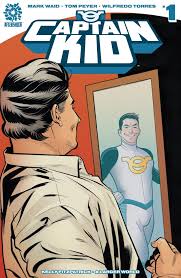Thursday Comics Hangover: Make Captain Marvel Great Again
On his 45th birthday, Chris is on the cusp of a few different disasters, each one more mundane than the last. His mother died, so he’s moved in with his ailing father. His body seems to be falling apart all at once. He’s been the music editor at a starving alternative weekly (the latest issue is just 28 pages, which in alt-weekly terms is basically a death sentence) for at least two decades, so his employability is questionable at best. But he’s out for a celebratory beer with friends, and he feels grateful for his schlubby nondescript white-guy life. It could be the beginning of a Stephen King story, or an off-brand Springsteen ballad.
On his way back from the bathroom, a young woman grabs Chris’s arm and starts yelling at him. With accusing body language, she snaps: “Why be old when you can be young?...Why be human when you can be more? Stop wasting time. You have the power.” The is fraught with a deeper social meaning: a young woman who appears to be African-American telling a white guy he has the power is a kind of on-the-nose moment.

If I didn’t know any better, I’d say that Captain Kid presents a play on Donald Trump’s campaign promises to return America to the days when it was “Great” (the subtext, of course, is white, and male.) Much hay has been made of Trump’s messaging being directed at older white men, who feel disempowered by the diversity and city-centric focus of President Obama’s America. Of course, Captain Kid was likely in the works long before Trump’s rise, but the comic still feels very of-its-moment.
Writers Mark Waid and Tom Peyer have been playing clever games with superheroes for decades now. (Waid most recently launched a very successful Black Widow series at Marvel with artist Chris Samnee.) Captain Kid has one foot planted firmly in postmodernism, but the other is in traditional superhero storytelling, with a plot revolving around a mysterious man who runs a potentially shady lawn and garden company. You won’t find the rawness of Marvelman here, or the grit of some of the more unfortunate Captain Marvel reimaginings of the last decade. They seem to like their main character, even as they challenge his own ideas about what he is.
And the art by Wilfredo Torres resembles the clean lines of Chris Sprouse, paired with the dynamic facial expressions of Samnee. This is good stuff — much better than some of the overwrought artists on mainstream superhero titles. It all combines into a slick, enjoyable package, the kind of book you wish mainstream superhero publishers were putting out.
Captain Kid packs in more than enough clever inversions of traditional superhero ideas to capture my interest, and if the book continues to pick at the political and racial ramifications of its premise, it will very likely become a monthly must-read. Waid, Peyer, and Torres are stomping on some hallowed ground here. They have the potential to create real mischief in future issues.